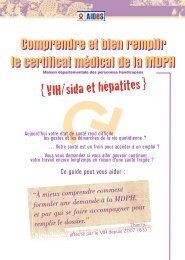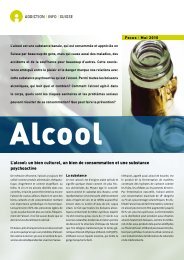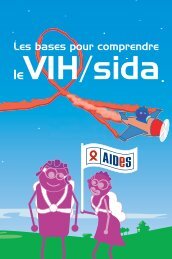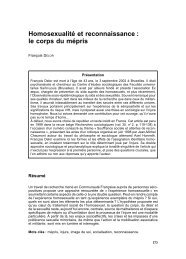<strong>Care</strong> <strong>and</strong> <strong>support</strong> <strong>for</strong> <strong>people</strong> <strong>living</strong> <strong>with</strong> <strong>HIV</strong>/<strong>AIDS</strong><strong>Care</strong> <strong>and</strong> <strong>support</strong> <strong>for</strong> <strong>people</strong> <strong>living</strong> <strong>with</strong><strong>HIV</strong>/<strong>AIDS</strong><strong>HIV</strong> is a slow-acting virus that typically takes years to produce illness in an infectedperson, in contrast to most viruses, which cause disease in a matter of days orweeks. Over the decade or so during which an <strong>HIV</strong>-positive person’s immunedefences gradually become undermined, various pathogens in the environment –other viruses, bacteria, fungi <strong>and</strong> parasites – take advantage of this weakness toattack <strong>and</strong> cause illnesses of various kinds. This is why the infections <strong>and</strong> cancersseen in <strong>HIV</strong>-positive individuals are called “opportunistic”.Effective therapies exist to prevent, treat or even cure many of these opportunisticdiseases, <strong>and</strong> to relieve the symptoms associated <strong>with</strong> them, which include fever,coughing, itching, difficulty in breathing or swallowing <strong>and</strong> chronic diarrhoea. Otherdrugs, developed much more recently, attack <strong>HIV</strong> itself – a so-called retrovirus,which explains why these new drugs are called antiretrovirals.The needs of <strong>people</strong> <strong>with</strong> <strong>HIV</strong> or <strong>AIDS</strong> extend far beyond drugs <strong>and</strong> health care,however. Those who suspect or learn they are infected need psychological <strong>support</strong>to cope <strong>with</strong> the implications of having a life-threatening disease. The fear of beingostracized by one’s family or community must be dealt <strong>with</strong>. People who are marriedor in a stable relationship need <strong>support</strong> in protecting loved ones from the virus,breaking the news to their partner <strong>and</strong> dealing <strong>with</strong> the issue of extramarital sex(women may find themselves under suspicion even when they have been infectedby their stable partner). At the same time, those affected by the epidemic need social<strong>support</strong> to alleviate the many consequences of an <strong>HIV</strong> diagnosis, repeated bouts ofillness <strong>and</strong> ultimately death, including the impoverishment of families already near orbelow the poverty line (see page 27).Meeting the needs: challenges <strong>and</strong> achievementsIn high-income countries, care <strong>and</strong> <strong>support</strong> are now taken more or less <strong>for</strong> granted.There is generally good access to antiretroviral drugs, which combat the virusdirectly <strong>and</strong> improve health <strong>and</strong> survival. People <strong>with</strong> <strong>HIV</strong> or <strong>AIDS</strong> <strong>and</strong> their organi-85
Report on the global <strong>HIV</strong>/<strong>AIDS</strong> epidemic – June 2000zations have played a role in health care, <strong>for</strong> instance by putting pressure on thepharmaceutical industry to reduce the prices of drugs. <strong>AIDS</strong> service organizations,created early in the epidemic by pioneers in the gay community, are still bringingpsychological <strong>and</strong> social <strong>support</strong> to <strong>people</strong> <strong>with</strong> <strong>HIV</strong>.Even in this favoured part of the world, however, care <strong>and</strong> <strong>support</strong> are not universallyoptimal. People who are prescribed antiretroviral therapy may not get enough helpto devise practical ways of adhering to their often-complicated drug regimens.Access to health care <strong>and</strong> especially to antiretroviral drugs can be problematic <strong>for</strong>illegal migrants, uninsured individuals in countries <strong>with</strong>out national health insurance,<strong>and</strong> residents served by less-favoured health facilities in countries where expensivedrugs are “rationed”. Some <strong>people</strong> have poor contact <strong>with</strong> the health system, or maynot be trusted to take their drugs regularly. In a study of drug users in one city in theUSA, half the <strong>people</strong> who met the criteria <strong>for</strong> treatment under national guidelineswere receiving no antiretroviral therapy at all, <strong>and</strong> just 14% were on the more expensivethree-drug combinations. A study of injecting drug users in Canada showed that60% were not receiving any antiretrovirals nearly a year after becoming medically eligible<strong>for</strong> this therapy; women were more than twice as likely as men to be untreated.In some countries, there is also less social <strong>support</strong> available <strong>for</strong> injecting drug users.The developing countries faced a radically different situation. By the time the enormousnew challenge of <strong>AIDS</strong> appeared, the health services <strong>with</strong> their dwindlingresources were already hard-pressed to cope <strong>with</strong> a host of older diseases. Usingthe 1991 guidance published by the World Health Organization (WHO), many countriesdid draw up clinical management guidelines <strong>for</strong> h<strong>and</strong>ling <strong>AIDS</strong> in children <strong>and</strong>adults by the mid-1990s. In practice, however, little action followed – apart from thestrengthening of tuberculosis programmes in places where an explosion of TB casesfollowed in the wake of the exp<strong>and</strong>ing epidemic of <strong>HIV</strong>. Carriers of the tubercle bacilluswho become infected <strong>with</strong> <strong>HIV</strong> face a 30–50-fold increase in their risk of developingactive tuberculosis.In part, the health sector’s failure to deliver care <strong>for</strong> <strong>people</strong> <strong>with</strong> <strong>HIV</strong> was linked tothe widespread perception of <strong>AIDS</strong> as a hopeless, untreatable disease, even thoughdrugs did exist to combat opportunistic diseases <strong>and</strong> distressing symptoms. Untilthe development of highly active antiretroviral therapy around 1995, it seemed thatone could do very little about <strong>HIV</strong> infection. Investing in care was rarely given highpriority. The need to invest in <strong>HIV</strong> prevention <strong>and</strong> other essential services often tookprecedence over the provision of care services in many developing countries.As the suffering caused by the epidemic grew, community-based <strong>and</strong> nongovernmentalorganizations, including organizations of <strong>people</strong> <strong>living</strong> <strong>with</strong> <strong>HIV</strong> or <strong>AIDS</strong>,stepped into the vacuum. Using a creative mixture of social, psychological <strong>and</strong>health care approaches, these groups did whatever they could to meet the widerangingneeds of the millions of <strong>people</strong> developing <strong>HIV</strong>-related illness <strong>and</strong> dying of<strong>AIDS</strong>. At the same time, they kept up pressure on the health system <strong>for</strong> more effective<strong>support</strong> <strong>and</strong> therapy. These dem<strong>and</strong>s were fuelled by the realization in the mid-86











